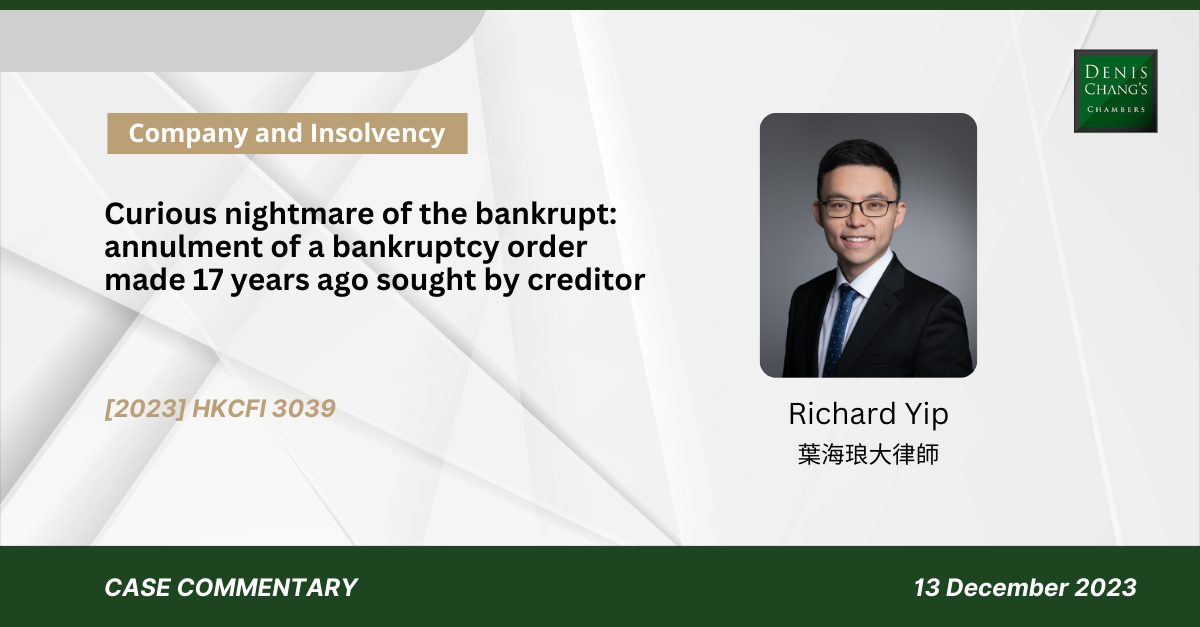
Curious nightmare of the bankrupt: annulment of a bankruptcy order made 17 years ago sought by creditor
Company and Insolvency
How do you recover a debt under a personal guarantee that is more than 20 years ago AND the debtor has already been discharged from bankruptcy with all antecedent debt forgiven? This is the problem faced by a lay client in a recent case done by Richard Yip (led by John Scott SC), together with Eviana Leung from Nixon Peabody LLP in Re Zhang Xiangming [2023] HKCFI 3039 where they represent the client to seek an annulment of the bankruptcy order made 17 years ago on the basis that the Court did not have jurisdiction over the bankrupt at the material time.
The stigma that follows bankruptcy is well known. Upon a person being declared bankrupt, their property is automatically vested in the trustee-in-bankruptcy. That remains so even after discharge. It is therefore desirable for a bankrupt to seek an annulment of the bankruptcy order if the relevant grounds are satisfied.
Yet, there are times when the bankrupt might oppose an annulment application particularly where the application is made by one of their creditors. The recent decision in Re Zhang Xiangming [2023] HKCFI 3039 is such a case and importantly clarifies the legal threshold that an applicant creditor must cross to obtain leave for making such an application.
The salient facts
Over twenty years ago, in or around 27 May 2002, the bankrupted (“Zhang”) signed a personal guarantee in favour of the lay client (“Gracewood”) securing a debt of USD16,626,816.86 (the “Debt”) owed by various PRC companies and/or their subsidiaries or associated companies. Zhang originally had a massive LPG business in the Guangdong Province, PRC, but it collapsed in 2002 and he disappeared from Mainland China ever since.
Unconnected with the above, a petitioner presented a bankruptcy petition against the bankrupt on 6 May 2005. The bankrupt was declared bankrupt on 6 July 2005 in his absence.
Four years passed and on 6 July 2009, the bankrupt was automatically discharged.
In around 2021, Gracewood discovered that Zhang has moved to New Zealand.
On 12 April 2022, Gracewood commenced a High Court action against Zhang for repayment of the Debt in Hong Kong. In parallel, Gracewood applied for freezing orders against Zhang and his former wife in the High Court of New Zealand. As part of his defence in New Zealand, Zhang argued his liability in relation to the Debt had been extinguished upon his discharge from bankruptcy in Hong Kong.
The applicant creditor therefore made an application to annul the bankruptcy order under section 33(1) of the Bankruptcy Ordinance, Cap. 6 (the “Ordinance”).
Reasoning
In considering whether to exercise the power under section 33(1)(A) of the Ordinance, the court should first look at whether there were any grounds on which a bankruptcy order ought not to have been made at the material time when it was made. If the court does not think that such grounds existed, it cannot invoke section 33(1)(a) to annul the bankruptcy order. If the court thinks that such grounds existed, it still has to consider whether it should exercise its discretion to annul the bankruptcy order.
In exercising the discretion, the court has to carefully consider the interests of the creditor, the debtor and the public, bearing in mind that a bankruptcy order is to be annulled only under exceptional circumstances. The burden is on the applicant seeking annulment to prove that at the time the order was made there were grounds on which the order ought not have been made.
Section 33(6) of the Ordinance stipulates that “any interested person may apply for annulment of a bankruptcy order with leave of the court”. The statute, however, does not define what the requisite test is for obtaining leave and there have been no previous cases discussing what is the requisite test.
Having considered submissions and the Law Reform Commission in its 1995 Report on Bankruptcy, DHCJ Herbert Au-Yeung reasoned that:
(1) Section 33(6) of the Ordinance was enacted so as to filter out applications which are unmeritorious. This purpose will be defeated if the threshold is set at too low a standard. It is meaningless (and will be a waste of time and costs) to let an application proceed if it does not even have reasonable prospect of success.
(2) An annulment application is a challenge of the court’s prior decision. In such circumstances, a higher threshold than that of serious question to be tried should be adopted.
(3) Thus, leave should only be granted if the Court is satisfied that the application for annulment has prospects that are more than fanciful without having to be probable. In effect, the same test for leave to appeal against an interlocutory decision.
The applicant creditor must be an “interested party”. In the present case, Gracewood’s claim was not time-barred. The terms of the guarantee stipulated that time only begins to run from the date of written notice having been served on the guarantor. Here, Gracewood only served a written notice on Zhang on 9 March 2022.
Zhang argued the applicant creditor was precluded by operation of an implied term or the prevention principle. The Court recognised that it is at least reasonably arguable that parties had contracted to exclude the operation of the limitation period by express agreement and as a result such time should only start to run from the date issuing the written demand. Further, it is also reasonably arguable that the alleged implied term did not exist because it contradicts an express term of the guarantee.
The Court also noted that given Gracewood’s evidence that the bankrupt had been nowhere to be found for a long time, it is at least reasonably arguable that Gracewood did not breach any alleged implied term even if such a term were to exist.
Discretion
Zhang also argued that the Court at the end of the day would not exercise its discretion to grant the annulment sought. The Court rejected such arguments. The Judge confirmed the interplay between two cardinal principles:
(1) where the Court had no jurisdiction to make a bankruptcy order in the first place, the discretion can only be exercised one way by rescinding the order which it had no jurisdiction to make. The Court cannot have discretion not to rescind because the effect of not rescinding would be to affirm the order which it had no jurisdiction to make;
(2) in any event, the Court should decide whether to exercise its discretion in not annulling a bankruptcy order despite the finding that it ought not to have been made in the first place by taking into account all the circumstances of the case.
In the circumstances of the present case, despite the long lapse of time between the date of the bankrupt order and the date of this application, it is at least reasonably arguable that the Court would exercise its discretion to annul the bankruptcy order.
Take away
The decision is the first decision in Hong Kong which clarifies the threshold test for making an annulment application by an interested party. The reasoning and ruling strike a fair balance that caters to any prejudice to the bankrupt as well as the vindication of rights of creditors.
Author:
Richard Yip

“He has courage to put forward the case of his client, but at the same time, he is not pushy.” Legal 500 Asia-Pacific 2021-2024, Commercial Disputes – Leading Junior (Tier 1)
Richard has a broad civil practice with a focus on shareholder disputes, commercial litigation, financial regulation, competition law and personal injuries. He joined Denis Chang’s Chambers in 2011. Prior to joining the bar, Richard was a corporate finance solicitor at Herbert Smith Freehills.
He represented four respondents in the second case before the Hong Kong Competition Tribunal, where the economic efficiency defence was raised for the very first time in Hong Kong. He was also involved in a number of substantial shareholder disputes, including Acropolis Ltd v W&Q Investment Ltd, 2018 HKCA 379 (appeal against interlocutory injunction concerning the EGM voting results of a listed company) and Waddington Ltd v Chan Chun Hoo Thomas, HCA 3291/2003 (trial of a double derivative action).Richard is also actively involved in the community and academia. He is a part-time lecturer at the University of Hong Kong.
Visit Richard’s profile for more details.
This article was first published on 13 December 2023.
Disclaimer: This article does not constitute legal advice and seeks to set out the general principles of the law. Detailed advice should therefore be sought from a legal professional relating to the individual merits and facts of a particular case. The photographs which appear in this article are included for decorative purposes only and should not be taken as a depiction of any matter to which the case is related. The views and opinions expressed in this article/material are solely those of the members authoring it and do not necessarily reflect the official policy or position of Denis Chang’s Chambers, or of any other member or members of Denis Chang’s Chambers.